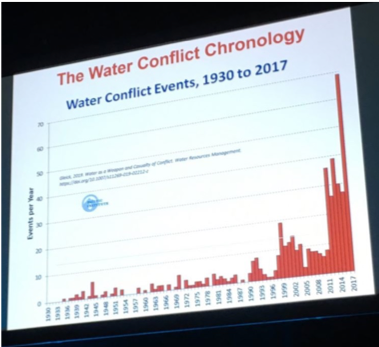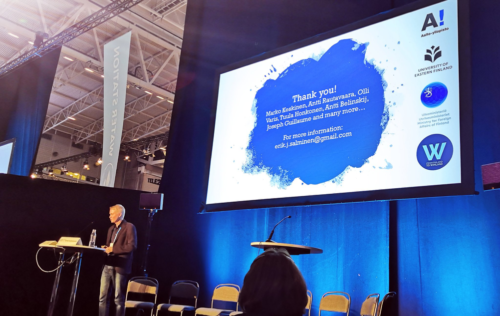The World Water Week is a high-profile event organised annually by the Stockholm International Water Institute. The Water Week is amongst the “world’s most influential, innovative and dynamic movement(s) focused on transforming global water challenges“. Erik Salminen from WDRG travelled to Stockholm to present the main findings of his master’s thesis research.
Setting the Stage for the Week
As my master’s thesis process was slowly gaining speed in early January of 2019, my supervisor Marko Keskinen and I noticed the call for abstracts for World Water Week, held annually at the end of August in Stockholm. We decided to go for it and submitted an abstract of my thesis. After a few months we received a notice that the abstract had been accepted and I would be presenting at a Water Governance session during the event. This was in a way a milestone for me, as during my previous and first time at the event two years prior, I had been awestruck by the distinguished speakers and interesting presentations and thought to myself that one day I would be presenting there too. That day just happened a lot earlier than I had expected!
I wrapped up my thesis Water Diplomacy – Establishing and Analytical Framework for Water Diplomacy with Case Studies from Central Asia and Iraq in July and began to look forward to the Water Week. I had purchased the complete week pass for two reasons: first, due to its affordable student prize and second for the valuable networking opportunity.
World Water Week 2019: Water for Society – Including All
An important piece of advice for anyone visiting the WorldWater Week is to scout the event before arriving. The amount of sessions and side events is mind-boggling and trying to decipher the event calendar can be more difficult than writing an introduction to a master’s thesis. In my opinion the best method is to log in to the event web page or app and search for interesting buzzwords and themes to mark down the events that seem most useful for your needs. This is what I did and ended up choosing one or two sessions for each day with enough time set aside for networking and getting ready for my own presentation on Thursday.
Altogether I chose eight events that I wished to attend. On Sunday I attended one of the first sessions of the week: Strategies for Reducing Conflicts over Water Resources. It was a great start as I got to witness the opening keynote from Susanne Schmeier, whose articles on water diplomacy helped me quite a bit during my thesis process. The session included information on new open source datasets on water-related conflicts, such as the Water Conflict Chronology (Figure 1) and interesting case studies on Afghanistan, Mali and Iraq. The discussion on Iraq and the Basra water crisis was particularly interesting as Iraq was also one of my case studies in my thesis.

On Monday, I attended the official opening session of the week. Although the topics tend to be quite general, I enjoy the opening session as it addresses the main theme of the week through different perspectives: political, technical and societal. The 2019 theme addressed the main objective of the 2030 Agenda – to empower people, ensure inclusiveness and equality in order to reach sustainable development in all countries.
Wednesday was possibly the highlight of my week as it contained two important water diplomacy related sessions: High-level panel on water diplomacy and Water diplomacy: promoting peace and equity. The idea behind the high-level panel was to discuss the role of shared water resources as a tangible entry point for sustained dialogue and conflict prevention with a special emphasis on so-called forgotten conflicts. The regions discussed were Yemen, South Sudan, Central Asia and Lebanon with possible development partners such as UNESCO and the World Bank discussing possible actions. I was struck by information regarding Yemen with over 4000 casualties annually due to water-related conflicts.
The second session of the day was jointly hosted by Finnish ministries and Aalto University. The event introduced the recent EU Council conclusions on water diplomacy and opened a discussion on the possibilities of water diplomacy to complement existing transboundary water cooperation mechanisms. The event included practical examples of water diplomacy in Senegal and Peru as well as interactive discussion on the topic. My supervisor Marko Keskinen provided a great insight into the background of water diplomacy: Our rich history of water cooperation, provides the foundation for water diplomacy in the first place.
Thursday was my big day with my presentation scheduled for the afternoon. I decided to relieve my nerves by taking part in another session in the morning: Analytical tools for identifying water conflict risks. I am glad I did as it provided a very interesting look into early warning tools for mitigating water conflict risks under development by organisations, such as World Resources Institute, University of Uppsala and the German Federal Foreign Office. I also got a confidence boost after realising the added value that our analytical framework provides even amidst these high profile, big budget projects. The inclusion of relevant stakeholders is the key benefit that sets our analysis apart from these data analysis tools.
Finally, it was time for my presentation “the Opportunities of Water Diplomacy” in the session Water Governance with and for all: Is it working? The aim of the session was to discuss the effectiveness of different approaches to water governance. Panchali Saikia from SIWI delivered one of the key points of the session in my opinion: It’s not just about getting data, but it needs to be in the right place with the right people at the right time. Afterwards I attended a debate with the other presenters after which it was time to say goodbye to this World Water Week. I owe a big thanks to all of my colleagues in the project as well as SIWI for giving me a chance to present at this esteemed event. Here’s to hoping this was not the final time!
Closing Thoughts
This was the second time I participated in the World Water Week, with the first time being in 2017 when I was doing an internship for the Ministry of Agriculture and Forestry. I stand by my thoughts from two years ago that WWW is a great opportunity especially for young professionals to update their information on current events and development through presentations from distinguished speakers. Additionally, the opportunity to network with development actors and organisations is unparalleled. This was the first time that I attended the event with the objective of mapping possible future opportunities and so I took some notes. Albeit simple, they might be of use to future attendees so I will list them here:
- Bring a lot of CVs or business cards. Preferably both.
- Never be afraid to network. It might seem difficult to throw yourself out there at first, but the ones who do will be remembered. There really is not much to lose.
- Practice pitching yourself. It is inherently difficult, but crucial to be able to provide a brief history and key strengths in a few sentences.
It was an inspiring experience and a milestone achievement to attend and present at this World Water Week. I am truly grateful to SIWI for giving us young professionals these opportunities as well as Sven Hallin Research Foundation sr for sponsoring my participation and travel. I hope to attend in similar circumstances in the future. Thank you, World Water Week 2019!

Suomeksi
Sain kunnian osallistua ja esitellä diplomityöni tuloksia Tukholmassa järjestettävillä Maailman vesiviikoilla elokuussa 2019. Päätin käyttää tilaisuuden hyväksi ja osallistua koko viikolle nähdäkseni kiinnostavia esityksiä ja verkostoituakseni tulevaisuuden työnhakua ajatellen.
Osallistuin viikon aikana kahdeksaan sessioon mukaan lukien omaani, joka oli viimeisenä iltana. Olin positiivisesti yllättynyt nähdessäni kuinka suuressa roolissa diplomityöni aihe, vesidiplomatia, oli sessioissa ja sivutapahtumissa. Erityisesti sessiot konfliktien ennakoimisesta ja ennaltaehkäisystä sekä Suomen ministeriöiden ja Aalto-yliopiston yhdessä järjestämä sivutapahtuma vesidiplomatiasta jäivät mieleeni.
Suosittelen vesiviikkoja erityisesti alan nuorille, sillä verkostoitumismahdollisuudet ovat käytännössä rajattomat. Harvoin pääsee myös kuulemaan ja näkemään näin paljon kiinnostavia esityksiä yhden viikon aikana. Lopuksi haluan kiittää nöyrästi työtovereitani ja SIWI:ä tästä mahdollisuudesta sekä Sven Hallinin tutkimussäätiötä osallistumisen ja matkojen tukemisesta. Uskon ja toivon, että meikäläisen näkee maailman vesiviikoilla myös tulevaisuudessa!
Erik Salminen (M.Sc. in Tech.) finished his master’s thesis on water diplomacy in the Water and Development Research Group at Aalto University in August 2019.

